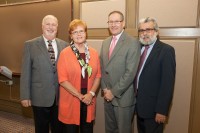“What Shall a Man Not Give in Exchange for his Life?”
“Five Youths Killed When Iowa Train and Auto Crash.”
“Three Killed In Indiana Accident.” (Man, Wife and Sister.)
“Three Killed As Fast Train Smashes Auto.”
(A young couple and a 12 year old girl were killed.)
TO THE SENATE AND THE HOUSE OF REPRESENTATIVES OF THE UNITED STATES OF AMERICA, IN CONGRESS ASSEMBLED:
Your Petitioner, a citizen of the United States, residing in the City of Chicago, State of Illinois, respectfully represents:
That the above quotations are taken from a Chicago newspaper on two successive days. The number might be increased by similar daily killings in various parts of our Country. Statistics show that in 12 years, from 1919 to 1930, 25,354 human beings in the United States were killed, many horribly, in railroad crossing accidents, and that 72,700 were injured, many of them doubtless crippled and rendered useless for life. At that rate there will be killed in a single generation more persons than the number of the United States soldiers killed in the World War (47,949). This slaughter of the innocent (for those killed were not guilty of any crime punishable by death) pales into insignificance the number of victims of the Car of Juggernaut in ages and countries we choose to regard as uncivilized. The roads through the tiger infested jungles of India and Africa are safer today than our American highways; and in those countries efforts are made to destroy the cause. No effective steps have been taken to remove the danger and to stop this useless destruction of human lives in large portions of our country. Communities have left the matter to the railroads, the railroads to communities.
What, then is to be done about it? Communities and railroads today, even if they wanted to abolish these grade crossings, are not in a financial position to do so. State, county, and municipal, as well as private corporate resources, are too exhausted for such an undertaking. It is most obvious that the railroads have not the money and will never have the money to abolish these man-killing grade crossings, nor can they be compelled to do so. Many of them are bankrupt, others on the verge of bankruptcy. Eventually the United States may take over the railroads of the country. Certainly it will have to continue its present policy of assisting them, in the interests of interstate commerce.
In this situation, and in the present state of unemployment, when the government of the United States is considering and devising means to combat the present business depression and to start again the wheels of industry, is it not a practical suggestion that the Congress should authorize the President to undertake this humane work of saving the lives of our citizens, more precious than things material? What wakes of human sorrow and financial loss follow these unnecessary deaths, no imagination can picture. Young and old, rich and poor, good and bad, alike are victims. Only the fact that these killings occur a few at a time and in many different places lulls us all into a feeling of security for ourselves, and ours, keeps us from rising in our might to end them, as we would if a public enemy or hostile force of nature were smiting us.
Would not this work be an investment on the part of the government? Would it not, if undertaken, have the distinct advantage over all other plans of relief, of reviving industry in every one of the 48 States of the Union? For in every one of these States are these deadly railroad crossings. Their removal would give employment in every locality where one exists, calling for unskilled and skilled labor, demanding the products of the mill, the mine, the factory, thus reviving industry in many of its forms and in many places.
If this work should cost 500 million dollars or more, it would be a wise investment, for the expenditure would be for work that ought to he done, and it would in time pay for itself in the saving not only of material things but in the most precious of our possessions–the lives of our fellow citizens. Tt wonk! he an appropriation that. in my opinion, would meet with the full approval of our people everywhere.
Your Petitioner, therefore, respectfully prays that the Congress of the United States may recognize this daily and avoidable destruction of the lives of our fellow citizens, and provide for the general welfare by appropriating a sufficient sum of money to abolish grade crossings along our main highways of travel lying outside the limits of municipalities in the United States.
Respectfully,
Edward T. Lee
Chicago, Illinois
May 3, 1933.


